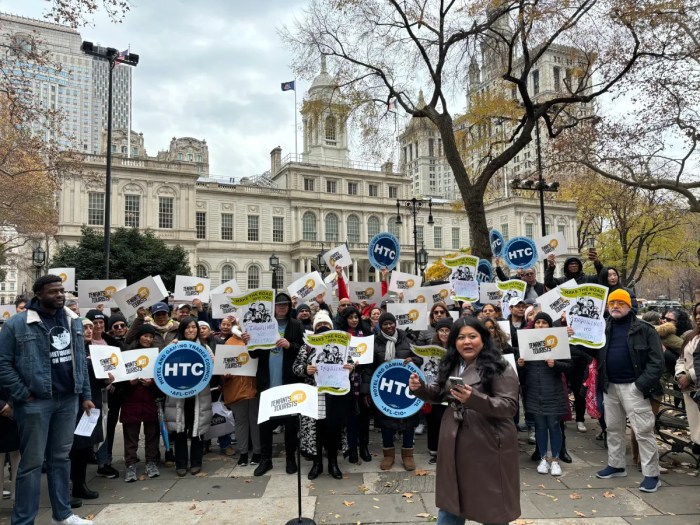By Bill Parry
Young women at more than a dozen high schools and middle schools in District 24 will have access to free feminine hygiene products now that the Department of Education has expanded a pilot program launched by City Councilwoman Julissa Ferreras-Copeland (D-East Elmhurst) last September.
A free dispenser was installed in the girls’ room at Corona’s High School for Arts and Business and attendance jumped 2.4 percent as fewer girls asked to be excused from classes throughout the day.
The groundbreaking initiative was rolled out Monday at Newtown High School in Elmhurst, which will get its dispenser by the end of the month. Ferreras-Copeland is set to introduce legislation for free feminine hygiene products in all city public schools and eventually in prisons and homeless shelters.
“Every young person should have their essential needs met in order to do well in school,” Ferreras-Copeland said. “Feminine hygiene products are as essential as toilet paper, helping women fulfill their daily activities uninterrupted by nature and prevent health risks. Providing young women with pads and tampons in schools will help them stay focused on their learning and sends a message about value and respect for their bodies. No young woman should face losing class time because she is too embarrassed to ask for, can’t afford or simply cannot access feminine hygiene products.”
DOE Deputy Chancellor Elizabeth Rose will oversee the program, the first of its kind in the nation. It is estimated to cost nearly $160,000 for installation of dispensers and supplies. In addition, the DOE will provide menstrual education in health classes and supplemental information and assemblies for families.
“Having easy access to feminine-care products is essential to ensuring that girls in our schools have the support they need to focus on learning and feel comfortable during classes,” Rose said. “This pilot marks a major step in providing additional resources to students in need.”
U.S. Rep. Grace Meng (D-Flushing) said feminine hygiene products should never be a luxury—they are a basic and essential part of women’s health.
“Too often, society attaches stigma and shame to menstruation, depriving young girls of resources, access and knowledge about their bodies,” Meng said. “Our young women should have unobstructed access to quality healthcare, and this first-of-its-kind initiative goes a long way to this crucial goal.”
Dr. Acklema Mohammad, chair of pediatrics at Urban Health Plan, pointed out that each woman needs 17,000 sanitary pads or tampons in her lifetime and they are expensive.
“For families struggling to afford food, purchasing feminine hygiene products adds another financial burden,” said Margaret Purvis, president and CEO of Food Bank in New York City. “When feminine hygiene products are available in Food Bank in New York City’s network of food pantries and soup kitchens, it comes as welcome and much-needed relief to women and girls whose families are already making sacrifices to put food on the table.”
Many of the women who spoke, as well as City Councilman Daniel Dromm (D-Jackson Heights), complained about the 4 percent state tax on feminine hygiene products. Items like prescription drugs, sunscreen and condoms are exempt from tax in New York state under the premise that they are essential to a person’s health. The tax adds 88 cents to an $11 pack of 50 tampons in New York, an added cost that many call a “woman’s penalty.”
The state Assembly voted unanimously to eliminate the sales tax on tampons and pads Tuesday afternoon a week and a half after Meng urged the chamber to repeal it. She called it a giant step forward in making essential feminine hygiene products more affordable to women.
“It also helps to change the way our society views menstruation,” Meng said. “Feminine hygiene products are not luxury items. These products are costly and necessary items that women must pay for over much of their lifetime.”
The legislation moves to the Senate, where top leaders support the bill.
Reach reporter Bill Parry by e-mail at bparr




































